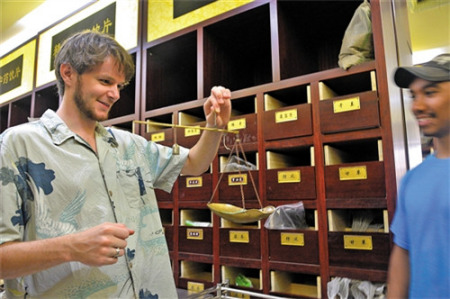To go global, TCM culture should be further understood

A foreign student learns how to weigh traditional Chinese medicine.
Recently, traditional Chinese medicine (TCM) culture was highlighted during TCM Cultural Day at UNESCO headquarters while the Central and Eastern European TCM Association was established in the Czech Republic. In an interview with CSST, scholars shared opinions on how to promote TCM culture internationally.
TCM culture draws upon the excellent legacies of traditional Chinese philosophy, religion and other fields to guide medical treatment, shape lifestyles and promote good mental health, said Li Haiying from the China Association of Chinese Medicine.
Zhang Qicheng, director of the School of Chinese Classics at Beijing University of Chinese Medicine, said that in addition to TCM technologies, it is crucial to spread across the world its core values, such as the balance of yin and yang as well as the unity of heaven and man.
Today, TCM is gaining more ground internationally. Chinese acupuncture is recognized in more than 180 nations and regions. In particular, TCM is regulated by law in Australia and many Canadian provinces.
TCM culture has been acknowledged by academia at home and abroad as one of the most creative and attractive aspects of traditional Chinese culture as well as one of the most widely accepted overseas. Li said TCM culture was once spread only by individual practitioners but there is now increasing cooperation between governments and organizations, covering various areas including Chinese massage Tui Na and medicine in addition to acupuncture.
Education is one of the most important approaches to spreading TCM culture, said Zhang Zongming, director of the Research Center for TCM Culture at Nanjing University of Chinese Medicine. Many Chinese universities have opened TCM majors and courses on TCM Chinese language studies in cooperation with international universities. Moreover, Confucius Institutes have also become a significant window through which the world can better understand TCM culture.
However, international acceptance of TCM culture still needs to be improved. Li noted that in the international community, TCM is still regarded as a complementary or alternative therapy, adding that TCM culture is far from being widely recognized and accepted due to cultural and regional reasons, which has restricted its role.
This is rooted in differences in Chinese and Western cultures as well as differences in theories and methods of Chinese and Western medicines. Zhang Qicheng said, Western medicine emphasizes using precise doses and effective pharmaceutical ingredients to kill germs. By contrast, it is not easy to know the accurate quantity of ingredients of Chinese medicine, and multiple medicines are used in combination to achieve an effect with the aim of enhancing human ability to resist disease and boosting immunity.
Cultural differences between the East and the West have made it challenging for TCM to go global. In response, Zhang Zongming said, scholars should translate and spread TCM classics, such as the Yellow Emperor’s Inner Canon, which forms the doctrinal basis of TCM. Modern technologies can be properly used to explore connotations of TCM culture. Furthermore, we should strengthen education and support more universities in opening courses to cultivate talent proficient in spreading TCM culture, he said.
WU NAN is a reporter at the Chinese Social Sciences Today.
